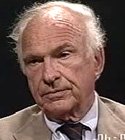|
James Macgregor BurnsTransformational Leadership Theory
Leadership With A Higher Purpose
James Macgregor Burns was one of the first thought leaders to embark on a more philosophical approach to the understanding of leadership. A number of major themes emerge from his work: [1] Power and purpose - the essential elements of leadership The first theme pinpoints the essential elements of leadership which he defines as power and purpose. James Macgregor Burns suggested, that we need to step back from our over-emphasis on power and see it in the context of human motives and physical constraints. [2] Leadership as a relationship of power with the led for a mutual purpose
Burns distinguishes between leaders and mere "power-wielders." Leaders in some way satisfy the motives and tap into the values of their followers, whereas power-wielders are intent only on realizing their own purposes.
Whether or not the people over whom they exert their power share the purposes, motives, and values is inconsequential to the power-wielder. To the leader, however, this sense of unity and shared values is his or her raison d'être and the source of his or her transforming influence. [3] Leadership as a moral endeavour This is his most significant theme: leadership, is more than wielding power or manipulating others, leadership is a moral endeavor. This general theory of moral leadership is revolutionary as Burns added a dimension of "moral purpose" to leadership study that has been neglected and otherwise overlooked.
What makes a leader different from a manager?
James Macgregor Burns began to define the distinct nature of leadership as a separate behaviour and activity to that of management. He moved us away from talking about leaders to talking about leadership. That shift alone made people view the topic in more philosophical ways rather than the more typical mechanistic or reductionist approach. Burns general theory of moral leadership helps us begin to understand what it is that makes a leader different from great managers and why leadership is a significant force in society.
These notes are an abridged version of:
The Themes & Theory of Leadership of James Macgregor Burns
courtesy of: Matthew R. Fairholm, Ph.d. Director, Leadership Studies and Development, Center for Excellence in Municipal Management, The George Washington University. I recommend his excellent report to you.
Return to Define leadership
Primal Leadership - The leader's emotions are contagious
Home Page
|




 Another major theme is that leadership is a relationship of power for a specific purpose that is consistent, or eventually consistent, with the motives, needs, and values of both the leader and the led.
Another major theme is that leadership is a relationship of power for a specific purpose that is consistent, or eventually consistent, with the motives, needs, and values of both the leader and the led. 

